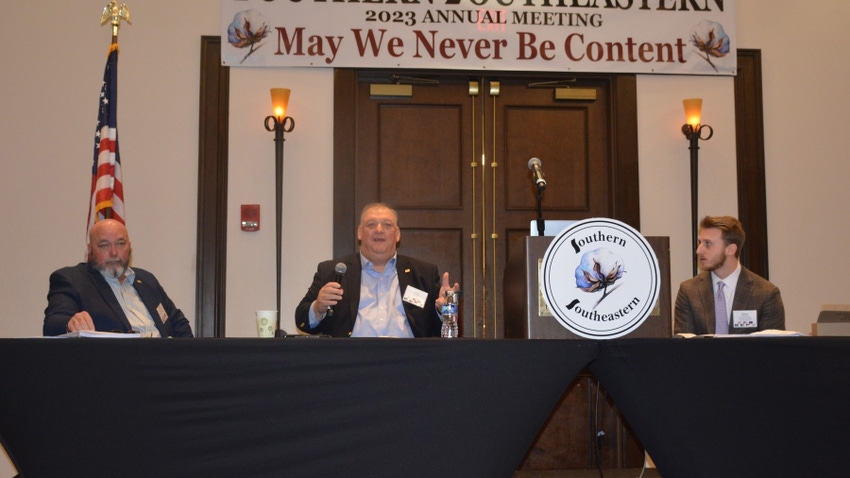
At a Glance
- Levi’s goal is to use 100 percent certified sustainable cotton by 2025.
Levi Strauss has long been a key customer for U.S. cotton, and giant retailer Target is an important outlet for consumers to buy cotton goods. Since the customer is always right, it’s important to listen to what these companies say when it comes to U.S. cotton.
Both Levi’s and Target are solidly behind the U.S. Cotton Trust Protocol to ensure the cotton they buy, and then eventually turn into products marketed to consumers, is sustainably produced and sourced.
The topic was part of a panel discussion held on Jan. 20 during the Southern Cotton Grower/Southeastern Cotton Ginners Association annual meeting at the Marriott Myrtle Beach Grand Dunes. Tillman White, National Cotton Council program engagement manager for the U.S. Cotton Trust Protocol, moderated the discussion. Participating were Kurt Smithwick, principal, responsible design for Target Corporation in Brennen, Ala.; and Scott Wagner, fabric manager, PD&S Bottoms, Levi Strauss and Co., Fort Lauderdale, Fla. They emphasized U.S. Cotton Trust Protocol is essential to verify the sustainably of U.S. cotton.
Launched in 2020, the U.S. Cotton Trust Protocol is designed to set a standard in more sustainably grown cotton. The protocol’s mission is to bring quantifiable and verifiable goals and measurement to the key sustainability metrics of U.S. cotton production.
Improving the environmental footprint of U.S cotton is a central goal. The protocol underpins and verifies U.S. cotton’s progress through sophisticated data collection and independent third-party verification.
Wagner noted Levi’s goal is to use 100 percent certified sustainable cotton by 2025. He said this can be either certified organic, certified by the Better Cotton Initiative or BCI, or certified by the U.S. Cotton Trust Protocol. He said Levi’s is looking for a globally recognized standard, and the Trust Protocol is needed because it certifies the environmental benefits of U.S. cotton.
BCI was established in 2005 and is a non-profit, multi-stakeholder group that promotes sustainable cotton across 21 countries. As of 107, BCI is said to account for 14% of global cotton production.
Third-party certification
“By 2030, we’re only going to use third -party certification, so that would be BCI globally, or U.S. Cotton Trust Protocol, or one of the globally recognized companies to verify,” Wagner said. “It’s not going to be us verifying, it’s going to be third party. We think the U.S. Cotton Trust protocol is going to be a good fit for our coverage of the world. U.S. Cotton Trust Protocol fits the way we grow things here.”
Smithwick said Target set a commitment in 2017 that 100% of the company’s branded products would use sustainably sourced cotton by 2022. “2022 has come and gone. We are probably 90 percent there.”
Smithwick said Target defines sustainably sourced as either BCI, Cotton Leads, organic or recycled Cotton.
“There are also NGOs that put pressure out there,” he said. “There is a big group called Textile Exchange. Target is a member and has been for a long time.They have what is called preferred fibers and materials. They don’t’ just focus on cotton, they focus on any fiber. Whenever we first put together our cotton commitment, Textile Exchange did not recognize Cotton Leads as preferred fiber material.
“They also had a cotton challenge. They wanted retailers and brands to sign up and commit to 100% preferred fiber material. We could not do that; we chose not to do that because U.S. cotton is not included in that. But now, with U.S. Cotton Trust Protocol, they have been added to the list. It makes it very, very important with U.S.cotton being the most exported cotton, the largest exporter.It doesn’t end up just in the U.S., it ends up all over the world. It is very, very important to have that certification attached to your product.
Target applauded the creation of U.S. Cotton Trust Protocol, Smithwick said.
He said BCI has its place and BCI’s reach around the world is good, but he stressed that cotton produced in other countries is clearly different than cotton produced in the U.S. For example, the average size of a cotton farm in India is just five acres.
“We use BCI because It is one of the available certifications out there; it helps us with a goal,” he said. “We need U.S. Cotton Trust Protocol to have certification on your product. It’s head and shoulders above everything else being produced in the world.”
Smithwick said U.S. cotton is recognized for its consistency of quality and that Target’s vendors, whether home textiles or apparel, always want to use U.S cotton if they are allowed to.
“Whether it’s import quotas or tariffs against it, they can’t always use it. But it’s always what they like. There are sound, responsible producing practices here. Everybody seems to be on top of things. We’ve got rules and regulations in place to tackle a lot of things that developing nations do not have.”
About the Author(s)
You May Also Like






